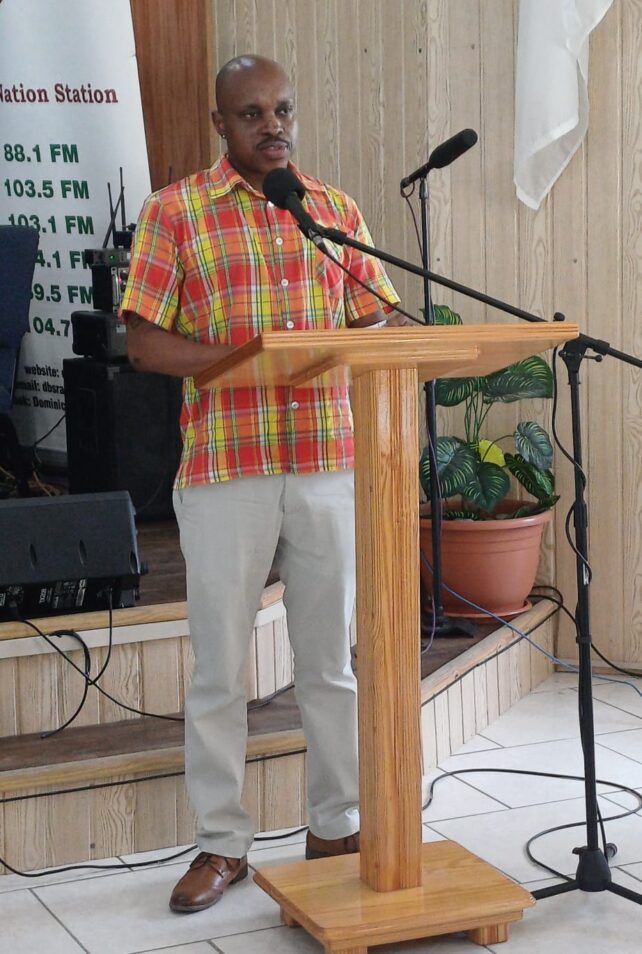
Acting Chief Cultural Officer, Earlson Matthew has announced that thus far in his tenure in that position, it has been a constant battle relating to the Creole language in schools. He made the announcement while addressing the official opening ceremony of the 14th Edition of the DBS Radio, Ministry of Education National Reading Competition held at the Berean Christian Academy in Bath Estate on Monday.
“We know what needs to be done, who needs to do it, and the potential outcomes, but somehow when the dust settles, the Creole Language as well as the visual and performing arts as a whole maintain their place as extracurricular,” he said. “And seemingly so, I could be wrong but we are looking to change that.”
Matthew continued, “And of course, this drive is a literacy drive so we are going to try to work it in where the Creole language is included in literary experience.”
With that said, he extended commendations to the groups and individuals who have made this their cause and championed that cause over the years.
“Not just in talk but with action that reflects the goal of inculcating certain traditional aspects into the daily lives of our youth, that they in turn, will grow and share,” Matthew stated. “That is how we preserve culture.”
In March the cultural division hosted the National Schools’ Arts Festival and although the festival is held every year, he said it is always a revelation when talent is on display.
Matthew believes that is confirmation that the youth are, in fact, interested in traditional, cultural, and artistic expressions.
“It also shows that their teachers and parents are indeed fulfilling their responsibilities as the driving force behind nurturing those talents and skills,” Matthew noted.

Creole/Patois is dear to our hearts, no doubt. However, we also have to be taught Swahili and establish relationships with African countries and other African people. Every one else is eyeing what we fail to develop. Earlson, as an African you do have the capacity to research and develop this. Don’t settle for mediocre.
Mr Mattthew it is a language phobia that goes way back to the elitist mined folks of Dominique. Maybe, a bit of insecurity as well with many parents.
The rest of the World are very proud of their dialects and embracing more than a handful of other languages. In China schools for example by age 10, several linguistic variances are introduced to the students. They do not think it is beneath their standard to learn , or consider it a threat to their status quo. The fundamentals of their ancestors lingo are embraced and honored. In addition to learning several foreign languages.
It is a must in a fast growing multi polar World. And. It is useful to identify fellow Domlichen in a foreign environment where camaraderie is emotionally helpful.
@EJ, noteworthy is your mention of China and ancestors. By age 10 their children are taught Chinese history and an advanced introduction to their ancestors and languages. The same for European-Jews but by age 9. But us, our children are taught European history by age 10 (I’m reluctant to even mention African History here). Our leaders recently boasted the installation of a Confucius classroom to introduce Chinese history and languages at the college at the least. We must teach African History at our schools or be continuously ignorant and held back from world civilization. Think of it seriously!
According to Earlson Matthew “The Creole Language as well as the visual and performing arts as a whole maintain their place as extracurricular,”
According to me “That is how the creole language should remain, an extracurricular fun dialect with no hard and and so called grammatical rules”
Given that up to 20% of pupils are dyslexic, it will be a cruel battle, and with the child on the receiving end.
For those who are dyslexic, speaking one language is difficult enough. However, we have other attributes that more than make up for the shortfall.
As a child, I was not able to pronounced my own name until I was five. The nearest I could get to Roger was “Ory”. On the other hand, when it came to drawing and making things, I could leave the rest of my peer group standing.
Does anyone know what approach is taken to teach or encourage the use of creole in the schools? Is it a core part of the curriculum? Are the kids taught how to read and write in Creole?
Back in the day when I was in primary school, I was beaten by the head teacher for speaking Creole outside of school hours. He had engaged pupils to act as spies to report back to him fellow pupils who spoke Creole after school hours. He said speaking Creole would take away from our ability to speak English properly. Therefore, Creole had to be stamped out. We were also strongly discouraged to speak Creole in our home.
I can understand creole very well, speak it well enough with a mixture of English and Creole in the same sentence. I cannot write it and about 25% literate in reading.
Zandoli, really sorry to read your experience, but please understand that your teacher’s mind was still colonized from an educational philosophy standpoint. For him/her, one had to be fluent in the queen’s langage, that was the best way towards progress and success.
That was the exact opposite to what should have been done. Indeed, modern scientific research as it relates to foreign langage learning and 2nd langage acquisition, proves that use of the first langage (vernacular), is the best medium to use in accomplishing mastery in the target langage. In your case, English. The vernacular ( Creole), is the first ” code” the child encounters in life and to suppress it, stultifies the child’s lingiustic development.
After all, the child is as safe in his/her mother’s arms as in his/her mother’s tongue !!